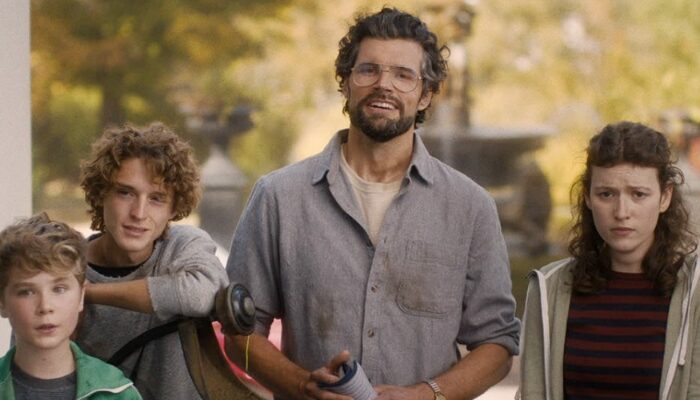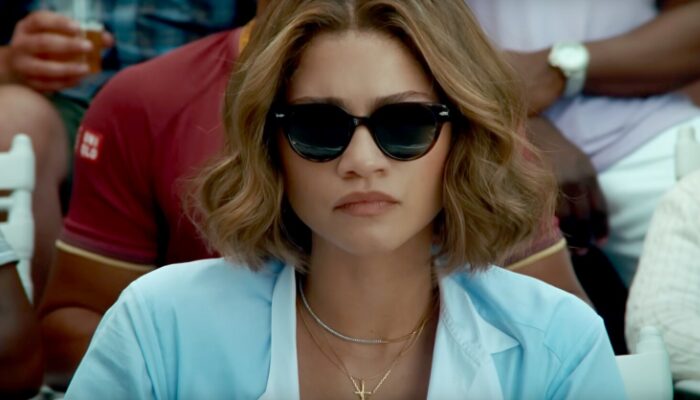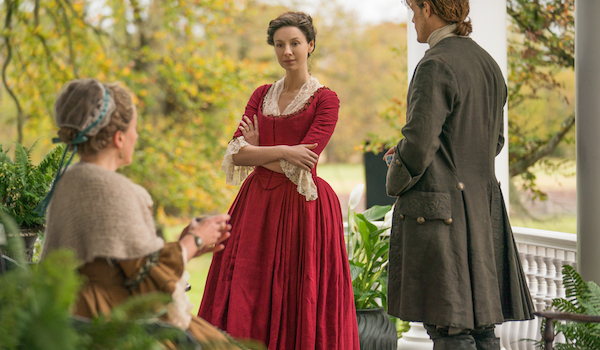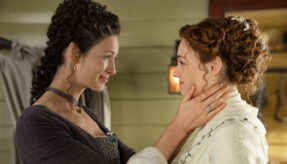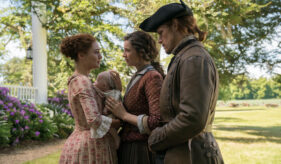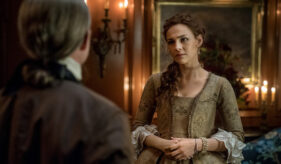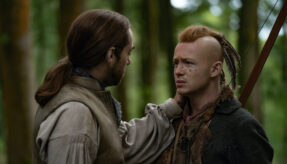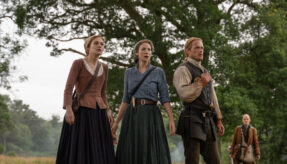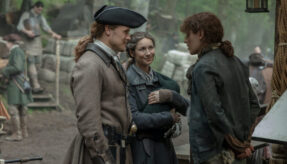TV Review: OUTLANDER: Season 4, Episode 2: Do No Harm [Starz]
Outlander Do No Harm Review
Starz’s Outlander: Season 4, Episode 2: Do No Harm is an episode that shows that 1767 colonial America is more morally treacherous and ambiguous than James “Jamie” MacKenzie Fraser (Sam Heughan) and Dr. Claire Beauchamp Randall/Fraser (Caitriona Balfe) could possibly have imagined.
Claire Fraser’s moral outrage about slavery, seen before in The Bakra, is unavoidable in Do No Harm as she has no qualms in speaking her mind with calm frankness to whomever is in her presence.
The rococo-nature of Jocasta MacKenzie Cameron (Maria Doyle Kennedy)’s estate can not hide its true nature, its deplorable underbelly, and its human-suffering buttressing. Free field work by slave labor is what created River Run, what sustains it, and what has made it prosper. The opulence of River Run can not assuage Claire Fraser’s guttural reaction to slavery and to those that blithely own slaves, like Jocasta MacKenzie Cameron. When Jocasta says that her slaves are well-treated and that she considers some of them her friends, the incredulous viewer automatically thinks “You treat your slaves well? Your slaves?” So you are less monstrous to slaves than everyone else in the territory. That doesn’t make you a saint or a good person. It only makes you less sadistic and violent (emphasis on “less”) but just as obsequious to your villainy, maybe even more so because at least the other slave owners have not diluted themselves into thinking that they are righteous in some way. “You consider some of your slaves friends? The people who you hold in bondage, whom live in an almost constant state of fear, you consider your friends? Slavery is how you treat some of your friends? That is how you are good to them?” An old saying says it best (paraphrased and modified) – with a friend like Jocasta MacKenzie Cameron, her slaves need look for no other enemy.
Her dubious moral ethics notwithstanding, Jocasta MacKenzie Cameron knows a good heir and business mind when she ‘sees’ one, hence her River Run offer to Jamie Fraser in Do No Harm. Jocasta listens and sympathizes with Jamie and Claire’s river boat tragedy and quietly calculates her move. Once Jocasta’s move is made, even Jamie marvels at her duplicity. The question is: How long can Claire and Jamie stomach slave ownership, which would automatically come with ownership (or stewardship) of River Run, and the environment that River Run exists in? My guess, not long. Fifteen thousand pounds might be more than River Run is worth. And a meritorious act by each slave that Jamie Fraser and Claire Fraser want to set free will be even harder to come by than the fifteen thousands pounds. The remaining segment of my guess – Claire and Jamie chose to leave River Run in the hands of Jocasta.
The ironic ending in America the Beautiful was difficult viewing but a beautifully orchestrated moment. The ironic moment at the end of Do No Harm is equally as powerful but in a far different way. Like America the Beautiful’s ending, the ending of Do No Harm is traumatic but it is also far more emotionally gut-wrenching for Claire Fraser when one considers all the work that she puts into Rufus (Jerome Holder), that she actually saves the young slave’s life, and then mercifully has to euthanizes him out of necessity. The story that Rufus tells after the operation about being kidnapped made it even worse as Claire realizes that Rufus has been living a life of sorrow for years and that the hooking (and then the euthanizing) are only the latest incidents in his melancholy life.
The slave overseer mob at the end of Do No Harm is a good representation of how northern Christians regard the slaves that they and others own in their section of America. They show as much respect to slave Rufus in death as they showed to him in life – zero.
The slave overseer mob wants blood, a body trophy warning, and their warped form of justice, even-though Rufus is dead and there is no one left to punish. All that is left is absentee retribution and a warning to the living slaves – strike white and die. Watching the mob whooping and hollering at the corpse puts a statement made by a northern aristocratic in Do No Harm into stark contrast – the aristocratic said [to paraphrase] that “the English’s presence in America is a good thing and that the savages (natives) should be thanking them for the industrialization, roads, etc. that they bring.” If the English settlers are so technologically advanced, so benevolent, why are they dancing around a tree by torch-light, cheering as a corpse is hoisted into it as if it is a sacrifice in a polytheistic religion? The mob and those they serve might be more technologically advanced, but inside, they as far worse than those they call “savages” or “natives” because their society is older, has matured. They should know better, act better. These might be Quaker or Jacobite sentiments but that doesn’t make them any less true.
Through Claire Fraser, Jamie Fraser is really growing as a well-rounded human being. He always seemed like a kind person but he was irrevocably a creature of his time period. Claire has opened his eyes to the fallacy of some of his beliefs and the beliefs held by others in his time period. Even better is the fact that Jamie is not just saying that he now believes these things, in Do No Harm (and in other instances) he actually proves it through action-after-action on the side of universal righteousness and justice.
Leave your thoughts on this Outlander Do No Harm review and this episode of Outlander below in the comments section. Readers seeking more Outlander can visit our Outlander Page, our Outlander Facebook, and our Outlander Google+ Page. Readers seeking more TV show reviews can visit our TV Show Review Page, our TV Show Review Twitter Page, our TV Show Review Facebook Page, and our TV Show Review Google+ Page. Want up-to-the-minute notification? FilmBook staff members publish articles by Email, Twitter, Tumblr, Google+, and Facebook.
Related Articles
FilmBook's Newsletter
Subscribe to FilmBook’s Daily Newsletter for the latest news!

